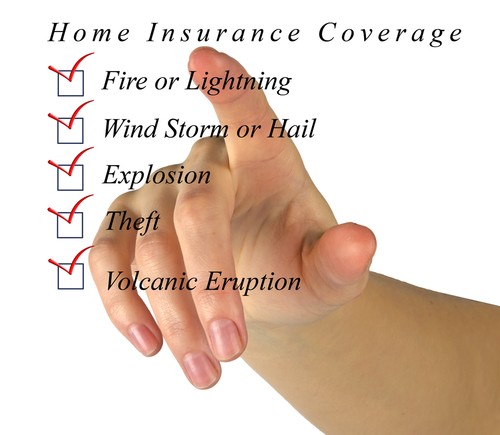If you own a home, you most likely have a mortgage. If you have a mortgage, you are required to maintain adequate insurance on the house in the off chance that it is damaged or destroyed. Unfortunately, that insurance coverage can be expensive. It is not fun to make those payments each and every month; however, it is a lot cheaper to pay insurance premiums than to pay for a new house if tragedy strikes. It is important to make sure you maintain adequate coverage, and a quick review of your policy will show you if you need to update what you have.
Homeowner’s insurance policies are usually looked at as policies that take on the risk of rebuilding or fixing the house in case it is damaged or destroyed. While that is their main function, these policies will also provide liability coverage, and help replace objects in case they are stolen. Most people will get enough coverage to reimburse them in the event that their house is completely destroyed. These policies usually come with coverage for your personal possessions, the maximum often being half of what the house is insured for. So if you have $100,000 of coverage on your house, your possessions will automatically be covered for $50,000.
There are two different ways to set up your policy when deciding how much coverage you want. The easiest way is to simply insure the home for market value. So if it burns down, you can find a new home that is substantially the same as the one you are now in. However, many people have built their lives around their homes, and they have put a lot of money into custom materials and architecture. Instead this homeowner can opt for rebuilding coverage. This will take into account all materials that are used in the house, and the coverage can be for quite a bit more than what the market says the house appraises for. This will let the owner rebuild their home exactly the same as it is if tragedy strikes.
The decision to insure for replacement or rebuilding costs is a personal one. For those who have recently purchased a cookie cutter house, they may only want to insure for replacement costs since they have not put time and effort into updating the house. Those who have lived in their home for a while, or built it themselves, getting more coverage would be beneficial. While more coverage sounds great, it is important to remember that more risk to the insurer means higher premiums to the insured.
Updating your policy is easy to do, especially if you have an agent or a broker. Simply call them up and tell them you want to review your coverage. If you think your house is not adequately covered, tell them that you want to insure for the costs of rebuilding. Increasing the coverage on your home will automatically increase the coverage on your possessions. If you have a collection that is worth quite a bit, or you feel your possessions are not adequately covered, you can raise just that coverage, often up to 75% of amount the house is insured for. Increased coverage may be less than you think, and peace of mind is worth the added cost.
If you own a home, you most likely have a mortgage. If you have a mortgage, you are required to maintain adequate insurance on the house in the off chance that it is damaged or destroyed. Unfortunately, that insurance coverage can be expensive. It is not fun to make those payments each and every month; however, it is a lot cheaper to pay insurance premiums than to pay for a new house if tragedy strikes. It is important to make sure you maintain adequate coverage, and a quick review of your policy will show you if you need to update what you have.
Homeowner’s insurance policies are usually looked at as policies that take on the risk of rebuilding or fixing the house in case it is damaged or destroyed. While that is their main function, these policies will also provide liability coverage, and help replace objects in case they are stolen. Most people will get enough coverage to reimburse them in the event that their house is completely destroyed. These policies usually come with coverage for your personal possessions, the maximum often being half of what the house is insured for. So if you have $100,000 of coverage on your house, your possessions will automatically be covered for $50,000.
There are two different ways to set up your policy when deciding how much coverage you want. The easiest way is to simply insure the home for market value. So if it burns down, you can find a new home that is substantially the same as the one you are now in. However, many people have built their lives around their homes, and they have put a lot of money into custom materials and architecture. Instead this homeowner can opt for rebuilding coverage. This will take into account all materials that are used in the house, and the coverage can be for quite a bit more than what the market says the house appraises for. This will let the owner rebuild their home exactly the same as it is if tragedy strikes.
The decision to insure for replacement or rebuilding costs is a personal one. For those who have recently purchased a cookie cutter house, they may only want to insure for replacement costs since they have not put time and effort into updating the house. Those who have lived in their home for a while, or built it themselves, getting more coverage would be beneficial. While more coverage sounds great, it is important to remember that more risk to the insurer means higher premiums to the insured.
Updating your policy is easy to do, especially if you have an agent or a broker. Simply call them up and tell them you want to review your coverage. If you think your house is not adequately covered, tell them that you want to insure for the costs of rebuilding. Increasing the coverage on your home will automatically increase the coverage on your possessions. If you have a collection that is worth quite a bit, or you feel your possessions are not adequately covered, you can raise just that coverage, often up to 75% of amount the house is insured for. Increased coverage may be less than you think, and peace of mind is worth the added cost.







